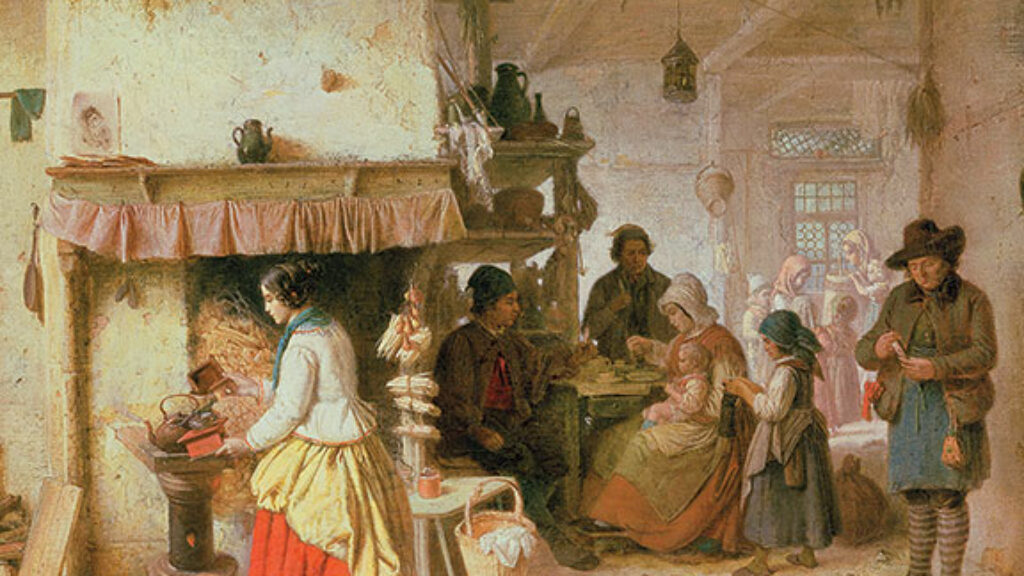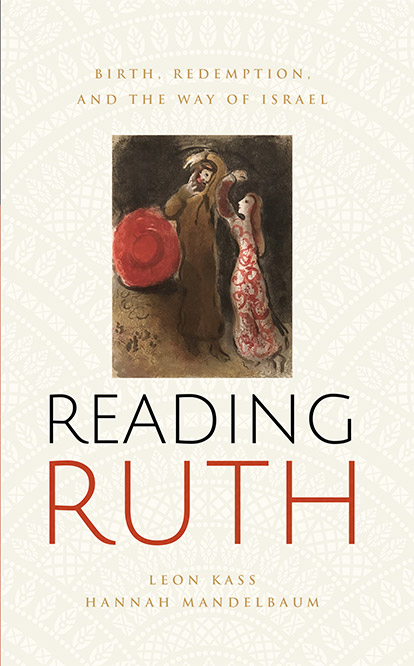“Wherever You Go, I Will Go”: Reading Ruth 1:16-17
The recently widowed Ruth will not be dissuaded from her decision to follow her mother-in-law to Bethlehem. In answer to Naomi’s final plea that she stay with her people and her gods in Moab, Ruth utters the magnificent words of love and loyalty for which she—and the entire book—are justly famous.
And Ruth said: “Entreat me not to leave you, and to return (lashuv) from following after you; for wherever you go, I will go (telkhi ’elekh); and where you lodge (talini; from lun), I will lodge; your people (‘am) shall be my people, and your god(s) (’elohim) my god(s); where you die, I will die, and there will I be buried; the LORDdo so to me, and more also, if anything but death part you and me.” (1:16–17)
For generations upon generations of readers, ourselves included, Ruth’s speech stands as the perfect expression of loving and devoted friendship. Her words, no matter how often we hear them, send our souls soaring. We fall in love with Ruth’s nobility, her wholeheartedness, her courage, her resolve, and her simple eloquence. Yet the speech, grand though it is, does not stand alone. It exists in a larger context to which it must be related and against which its significance must finally be judged. Occurring merely three-fourths of the way through the first of the book’s four chapters, it presents the book’s first word on love and friendship but hardly its last. We do it no harm if we slow down, analyze its contents, and see how it fits with what came before and what comes next.
The big picture is clear: Ruth insists on being allowed to stay with Naomi. She is not afraid to abandon her home and her Moabite gods. She is not deterred by thoughts of being a despised alien in Israel or by the burdens of becoming a follower of Israel’s God. And, as her answer makes clear, she is definitely not put off by the idea—emphasized again and again by Naomi—that she may never marry again. Having earlier joined herself to Naomi’s son, Ruth now “espouses” herself to Naomi: to cleave to her wherever she goes, wherever she lodges, wherever she abides. Speaking not as a daughter-in-law or even as a daughter but as a “bride,” she will live and die attached to Naomi, and therefore also to Naomi’s people and even to Naomi’s god(s). Also like a spouse, she will be buried at her side. And when Ruth solemnly invokes (for the first time) the Lord God of Israel (not the ’elohim of Moab), it is not in expression of reverence or in prayer for a blessing. She invokes Him only to call down His punishment on her—misery like yours, Naomi, and more so—should she allow anything but death to separate them.
Two large matters invite comment: the first regards love and friendship. Because, as we have noted, Ruth’s words of endearment resemble those of a loving bride, not a few contemporary critics have seen her speech as a declaration of homoerotic love. But there is not a shred of evidence in the text—not here, not later—to support such a sexualized reading. There is nothing of sexual longing in Ruth’s heartfelt speech to Naomi. On the contrary, her words bespeak a profound desire—and capacity—for loyal and devoted friendship, that lifelong being-together of souls that, as much as is possible and beyond any mere concourse of bodies, can overcome the isolation and separation of human beings. What Ruth promises to Naomi is the rare sort of friendship based not on pleasure or utility but mainly on virtue, originating in admiration, affection, and goodwill for each other and flourishing in the sharing of life’s journey together. Naomi had urged Ruth to adhere to her own gods in the hope they would bring her a new husband. Ruth counters by promising adherence only to Naomi: Despite your miseries and embittered lot, despite your dried-up womb, despite your accursed and god-forsaken life, I love and admire your soul and your very being, and I pledge my life to be with you forever. It is a sad commentary on our time that we cannot accept at face value even the possibility—never mind celebrating the grandeur—of such an exalted same-sex but non-sexual relationship.
Some readers, feeling the great passion in Ruth’s speech, will balk at using the word “friendship” for the relationship she proposes. Friendship, they hold, is an emotionally cooler love. Friends do not swear undying devotion. Only lovers cleave; friends keep a respectful distance. But intense friendships between women (and even some rare friendships between men, like those between David and Jonathan or Achilles and Patroclus) are anything but emotionally tepid. Lifelong mutual devotion at the highest level will never be common, but even people who have not personally experienced such friendship have long admired its emotional intensity and recognized it as precious. At the same time, however, we must not automatically conclude that the Bible is endorsing the relationship that Ruth so beautifully proposes to Naomi. For we may not assume that Ruth here speaks for the biblical author, any more than we can assume that Macbeth speaks for Shakespeare when he asserts that life “is a tale told by an idiot, full of sound and fury, signifying nothing.” Ruth is speaking (only) for herself, albeit in gorgeous words that the biblical author has indeed written for her. What that author thinks about Ruth’s words—whether he prefers loving friendship to marriage and procreation—we must wait and see.
The second theme concerns religious identity and the divine. What is the theological significance of Ruth’s speech and her declaration to return with Naomi? Is this in fact an act of “conversion,” tacit if not explicit, to the worship of the Lord God of Israel and to joining His people? Naomi had introduced the subject of the divine, first, by praying that Israel’s God (invoking the Tetragrammaton)will be kind and generous to her daughters-in-law; second, by asserting that Hehad forsaken her and struck her down; and finally, by urging Ruth to return to her own “gods.” (Note her polytheistic assumption.) But in refusing Naomi’s directive, Ruth declines to take the theological hint, one way or the other. Instead, she expresses her wholehearted devotion to Naomi. It is Naomi, not God, who is emphatically the object of Ruth’s piety and devotion: the word “you”—meaning Naomi—occurs six times in Ruth’s two sentences; the word “your” occurs twice more.
It is true that Ruth also pledges that Naomi’s people and Naomi’s god will become her own. Yet in both cases, it seems that those loyalties derive from their being Naomi’s: your people and your god will be mine, but only because they are yours. Being yours, they are, of course, encompassed in my great love for you.
We know nothing of the theological attachments of Naomi’s husband Elimelech and his sons during their time in Moab, though we suspect they may have wandered off along with the move. Traditional readers like to assume that Mahlon and Chilion remained devoted to the God of Israel and that their wives already accepted Him as their own. But that may be wishful thinking. And, in any case, Israelite religious coloration of these “mixed marriages” would have been moot in Moab, there being no Israelite community or religious activity to join. Ruth’s religious and national attachments will become an issue only back in Judah; and so she makes clear to Naomi that she will adopt those of her beloved mother-in-law and friend—again, because they are dear to her.
None of this looks much like religious conversion—and we have already noted that to speak of “conversion” is, in any case, an anachronism. Yet some might adduce one bit of evidence to suggest that Ruth has already “accepted” the Lord God of Israel. After speaking of “your god” becoming also “my god” and using for this purpose the non-specific (and grammatically plural) Hebrew word ’elohim, she invokes the Tetragrammaton, calling on the God of Israel, calling on Him to inflict great misery upon her should she renege on her promise of fidelity to Naomi. In keeping with what Naomi had said about the misery inflicted on her by the Lord, Ruth, too, invokes Him not as a source of blessing but only, should she part from Naomi, as a source of punishment—to do to her what He has already done to Naomi. If this is Israelite piety, it is at best highly partial and poorly informed.
Will the love of Ruth and Naomi bear theological fruit? Will the Lord God of Israel look favorably on Ruth’s pious devotion to Naomi? Will Ruth’s love for Naomi restore the latter’s faith in God? The reader is left in suspense.
As befits its eloquence, Ruth’s speech is a conversation stopper. But as befits the human situation, we expect to hear a word from Naomi in response to her daughter-in-law’s vow of permanent attachment—if not a word of praise, at least a word of gratitude. Instead, we are treated to silence.
And when she [Naomi] saw that she [Ruth] was obstinately minded to go with her, she ceased speaking to her. So they two went until they came to Bethlehem. (1:18–19a)
Naomi remains silent not because she is pleased that Ruth will join her or because she is persuaded to accept Ruth’s declaration of abiding friendship. She is silent because further argument would be useless. Ruth is adamant; Naomi yields, out of resignation. Ruth appears to have won the day; in truth, however, Naomi, ever the advocate for marriage, has not surrendered. The two women walk in silence, perhaps all the way to Bethlehem, a trip taking more than a week. Each has much on her mind.
This essay is adapted from Reading Ruth: Birth, Redemption, and the Way of Israel.
Suggested Reading

New Gleanings from an Old Book
Ruth, one of the shortest books in all of Tanakh, has a simple plot: A man from Bethlehem moves with his family to Moabite territory to ride out a famine in Judea, his two sons somewhat scandalously marry Moabite women, and all the men subsequently die.

A Tale of Two Night Vigils
The tradition to stay up all night studying on Shavuot is far more well-known than the tradition to do so on Hoshana Rabbah. Neither would have been possible without Kabbalah and caffeine.
Something Antigonus Said
When the Saducees misinterpreted Antigonus of Sokho, they lost eternity--at least that's what the Rabbis thought.
Standing at Sinai in Medieval Germany
An unusual illustration of revelation from the fourteenth century Tripartite Mahzor.

Comments
You must log in to comment Log In